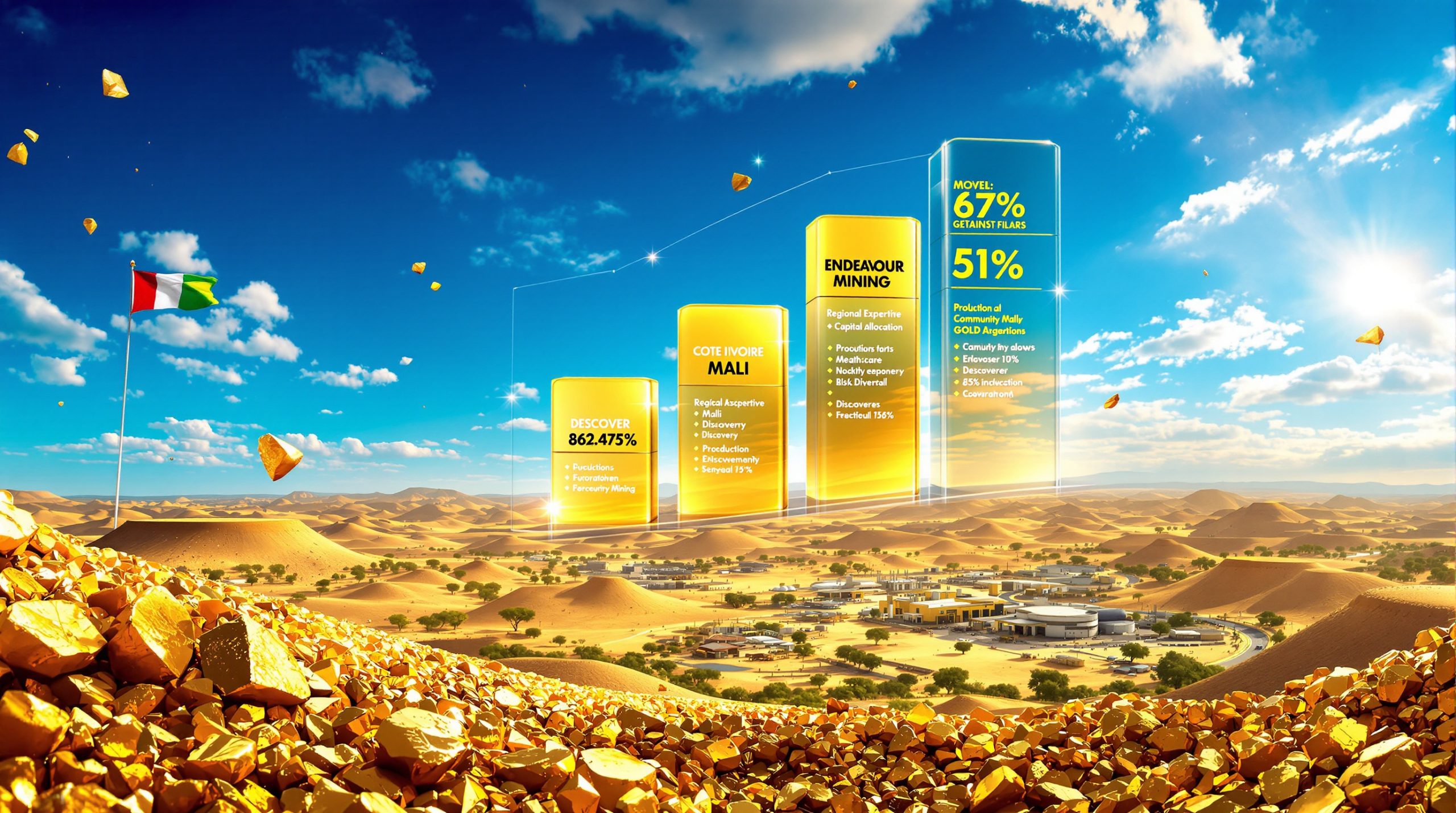Understanding Endeavour Mining's Regional Dominance Strategy
Endeavour Mining has established itself as the premier gold producer in West Africa through a comprehensive approach that balances operational excellence with strategic long-term positioning. The company's Endeavour Mining West Africa strategy centres on maintaining market leadership while systematically addressing the unique challenges of operating in this resource-rich but politically complex region.
The company operates across multiple West African jurisdictions including Mali, Senegal, Côte d'Ivoire, and Burkina Faso, with annual production targets set between 1.11 to 1.26 million ounces for 2025. This operational scale reflects the company's commitment to maintaining its dominant position in the region despite recent political volatility.
CEO Ian Cockerill emphasises that the company's methodology involves maintaining market leadership while systematically addressing regional challenges. This approach contrasts with industry peers who have reduced their West African exposure, positioning Endeavour uniquely in the market. The company's leadership repeatedly states they are certainly not walking away from West Africa, demonstrating strong managerial commitment despite regulatory uncertainties.
Key Strategic Pillars:
• Regional expertise and operational synergies across multiple jurisdictions
• Disciplined capital allocation balancing growth with profitability
• Community-centric development approach ensuring social licence to operate
• Risk diversification initiatives including exploration beyond West Africa
In 2023, Endeavour Mining reported a $2.3 billion total economic contribution across operational countries, demonstrating substantial economic impact beyond direct mining operations through employment creation and supply chain development. This figure underscores the company's significant role in regional economic development and strengthens its position in stakeholder negotiations.
What Makes West Africa Central to Endeavour's Growth Vision?
Despite expanding exploration activities into Central Asia through a $25 million joint venture with East Star Resources in Kazakhstan, Endeavour Mining remains fundamentally committed to West Africa as its primary growth engine. The region offers several competitive advantages that align with the company's operational expertise and strategic objectives.
Since 2021, Endeavour has discovered 12.2 million ounces of resources in West Africa, establishing a five-year discovery target of 12-17 million ounces of indicated resources. These figures suggest discovery rates of approximately 2.4 million ounces annually from 2021-2025, with targets potentially increasing to 2.4-3.4 million ounces annually for future periods.
Furthermore, comprehensive mineral exploration insights demonstrate the geological potential that continues to drive investment in the region. Regional Advantages Framework:
| Factor | Strategic Benefit |
|---|---|
| Geological Potential | Proven gold-bearing formations with exploration upside |
| Operational Expertise | Deep understanding of local mining conditions |
| Infrastructure Synergies | Shared logistics and supply chain efficiencies |
| Regulatory Knowledge | Established relationships with government stakeholders |
CEO Cockerill explicitly references looking for the mines that will be developed in the 2030s, indicating exploration activities are targeted toward production commencement within a 5-8 year horizon from late 2025. This long-term perspective demonstrates strategic maturity in accepting near-term regulatory volatility in exchange for long-term resource position building.
The Sabodala-Massawa mine in Senegal exemplifies this approach, where a mining convention extends to 2040, providing clear visibility into regulatory framework consistency for the next 15 years. Additionally, the recent Lafigué mine commencement of commercial production in 2024 demonstrates successful asset ramp-up execution within West Africa.
The company's leadership characterises West Africa as offering competitive advantages that align with operational expertise and strategic objectives. This suggests the region provides not merely resource potential but operational environment familiarity that creates competitive advantages against new market entrants.
How is Endeavour Managing Regulatory and Political Risks?
West Africa's evolving regulatory landscape presents both challenges and opportunities for mining companies. Endeavour's Endeavour Mining West Africa strategy demonstrates sophisticated stakeholder engagement and adaptive planning in managing these complex dynamics.
The Sabodala-Massawa mining convention extends to 2040, providing 15 years of regulatory certainty from November 2025. However, the Ity Mine convention in Côte d'Ivoire requires renewal, with company expectations to sign a new convention relatively soon. This mixed landscape requires careful navigation of different regulatory timelines across the portfolio.
Mining Code Evolution Strategy
Endeavour employs a multi-faceted approach to regulatory risk management. The company maintains proactive engagement with government officials before regulatory changes occur, rather than reacting after policy announcements. This forward-looking approach enables better preparation and negotiation positioning.
In addition to stakeholder engagement, current mining industry trends show that companies with established relationships and deep regional expertise are better positioned to navigate regulatory changes. The company leverages existing mining conventions that extend to 2040 for Sabodala-Massawa, providing contractual protection against regulatory changes.
Additionally, stabilisation clauses in agreements like the Ity mine offer contractual protections to minimise near-term royalty increases.
Political Stability Assessment
CEO Cockerill takes a pragmatic view of political developments, distinguishing between aspiration and ability to deliver when evaluating potential regulatory changes. This measured approach helps investors understand realistic timelines for policy implementation.
Regarding Senegal mining code changes, Cockerill explicitly states that changes by year-end are unlikely, positioning December 31, 2025 as a near-term political marker. He acknowledges that the trajectory of mining code changes is likely to be higher over the longer term, but emphasises the undefined timeline for implementation.
As of November 11, 2025, Senegal's ruling party dissolved the coalition that brought President Bassirou Diomaye Faye to power, heightening political uncertainty during a national debt crisis resolution period. This development adds complexity to regulatory prediction timelines.
CFO Guy Young notes that regarding Côte d'Ivoire negotiations with the Chamber of Mines, the state's primary focus appears to be on royalty rates rather than production curtailment or asset nationalisation. This identification of specific regulatory pressure points enables targeted preparation strategies.
Key Insight: While upward pressure from all states regarding royalty rates is expected, the company relies on existing stabilisation clauses to protect current operations from near-term increases.
What Role Does Exploration Play in Endeavour's West African Strategy?
Exploration represents the cornerstone of Endeavour's long-term positioning in West Africa, with ambitious targets that demonstrate confidence in the region's geological potential and form a critical component of the overall Endeavour Mining West Africa strategy.
The company's exploration success demonstrates significant momentum, with 12.2 million ounces discovered since 2021 against a five-year discovery target of 12-17 million ounces of indicated resources. This achievement rate suggests the company is on track to meet or exceed its exploration objectives.
However, as recent gold prices analysis indicates, current market conditions provide favourable economics for resource development and expansion activities. Exploration Metrics and Performance:
| Metric | Achievement/Target |
|---|---|
| Resources Discovered (2021-2025) | 12.2 million ounces |
| Five-Year Discovery Target | 12-17 million ounces (indicated resources) |
| Target Discovery Rate | 2.4-3.4 million ounces annually |
| Annual Production Target (2025) | 1.11-1.26 million ounces |
Asset Development Pipeline
The company's development pipeline reflects different stages of asset maturity. The Assafou Project represents a promising prospect in Côte d'Ivoire requiring convention negotiation, indicating regulatory barriers must be cleared before development can proceed. This exemplifies the intersection between exploration success and regulatory risk management.
The Lafigué Mine recently commenced commercial production in 2024, providing concrete evidence of successful West African project delivery from exploration through production. This achievement supports confidence in pipeline execution capabilities.
The Sabodala-Massawa BIOX Expansion focuses on enhancing existing asset productivity through Biological Oxidation technology implementation. This represents process optimisation and capacity enhancement as a less capital-intensive growth avenue compared to new mine development.
CEO Cockerill frames exploration as the company's approach to looking for mines that will be developed in the 2030s, positioning exploration as a long-term optionality strategy rather than a near-term production driver. This temporal separation allows for geological risk spreading across multiple potential developments.
The discovery metrics of 12.2 million ounces since 2021 are characterised by leadership as evidence of confidence in the region's geological potential, positioning West Africa as a high-probability exploration environment suited to the company's technical expertise and operational approach.
How Does Endeavour Balance Growth with Operational Excellence?
The company's approach to sustainable growth emphasises operational efficiency alongside expansion, ensuring that increased production doesn't compromise profitability or operational standards. This balance forms a central element of the Endeavour Mining West Africa strategy.
Endeavour targets annual production exceeding 1.1 million ounces, with the specific range set at 1.11-1.26 million ounces for 2025. This represents current operational scale across production facilities while maintaining focus on profitability metrics.
Cost Management Strategy
The company emphasises maintaining industry-leading all-in sustaining costs (AISC) while pursuing growth opportunities. This approach prioritises capital-efficient growth projects over volume-at-any-cost expansion strategies. Operational synergies across regional assets provide cost advantages through shared processing facilities, transportation corridors, and supply chain vendors.
Production Optimisation Framework
The company's production optimisation focuses on converting resources to reserves, thereby extending mine life and maximising return on exploration investment. This methodology suggests emphasis on reserve-to-production ratios and resource conversion efficiency as key performance metrics.
Strategic asset portfolio management enables the company to balance near-term production optimisation with long-term development pipeline advancement. The approach separates temporal focus areas: near-term emphasis on maximising current asset performance, mid-term focus on identified resource conversion to reserves, and long-term focus on new mine development.
The 2023 total economic contribution of $2.3 billion across operational countries provides evidence of substantial value creation, though the breakdown between direct operations and indirect economic effects requires further analysis to assess operational efficiency metrics.
What is Endeavour's Approach to Community Relations and Sustainability?
Sustainable mining practices and community engagement form integral components of Endeavour's West African strategy, recognising that long-term success requires social licence to operate. This community-centric approach strengthens the overall Endeavour Mining West Africa strategy through stakeholder support.
The company's community investment extends beyond traditional corporate social responsibility programmes to encompass infrastructure development that supports long-term regional economic growth. Educational infrastructure development through school construction provides foundational support for future workforce development and community advancement.
Community Investment Initiatives:
• Educational infrastructure development through school construction
• Healthcare facility construction improving regional medical access
• Public water system installation enhancing community health outcomes
• Local procurement policy implementation supporting regional businesses
Economic Impact Metrics:
The company's $2.3 billion total economic contribution in 2023 across operational countries reflects both direct and indirect employment creation. This substantial economic footprint strengthens the company's negotiating position with government stakeholders and demonstrates tangible community benefits from mining operations.
Local supplier development programmes create multiplier effects throughout regional economies, extending the company's economic impact beyond direct employment. This approach builds community support while developing reliable local supply chains that can reduce operational costs and logistics complexity.
The sustainability approach recognises that community relations represent a critical component of operational risk management. Strong community relationships can provide early warning systems for potential social unrest and create supportive environments during regulatory negotiations.
How is Endeavour Diversifying Beyond West Africa?
While maintaining West African focus, Endeavour has begun strategic diversification to mitigate jurisdictional risk and secure additional growth opportunities. This measured expansion complements rather than replaces the core Endeavour Mining West Africa strategy.
Kazakhstan Joint Venture
The partnership with East Star Resources represents a significant strategic development, involving an investment commitment of up to $25 million ahead of feasibility studies. The agreement targets "tier one" gold deposits in central and northern Kazakhstan, representing the first time Endeavour has explored opportunities outside of Africa.
The Kazakhstan initiative focuses on development timelines for the 2030s, aligning with the company's long-term planning horizon. This timeline allows for thorough evaluation and development planning without immediate capital deployment pressure.
Strategic Rationale
CEO Cockerill characterises this diversification as "baby steps" outside West Africa, providing optionality without abandoning core regional expertise. The measured approach suggests risk management through geographical diversification while maintaining operational focus on areas of established competence.
The expansion rationale centres on looking longer term for mines that will be developed in the 2030s. This strategic timeframe allows for comprehensive evaluation of new jurisdictions while maintaining commitment to West African operations through the medium term.
Meanwhile, mineral beneficiation opportunities in other African regions continue to present strategic value-addition possibilities. The Kazakhstan venture provides hedge against concentrated jurisdictional risk while potentially accessing different geological environments and regulatory frameworks.
What Challenges Does Endeavour Face in West Africa?
Operating in West Africa presents unique challenges that require sophisticated management approaches and strategic flexibility. Understanding these challenges is crucial for evaluating the effectiveness of the Endeavour Mining West Africa strategy.
Primary Challenge Categories:
| Challenge Category | Specific Issues | Management Approach |
|---|---|---|
| Regulatory | Mining code revisions, royalty increases | Proactive engagement, legal protections |
| Political | Government transitions, policy uncertainty | Stakeholder relationships, diversification |
| Operational | Infrastructure limitations, logistics | Regional synergies, local partnerships |
| Social | Community expectations, environmental concerns | Sustainable development programmes |
Regulatory Evolution Pressures
CFO Guy Young acknowledges there is ongoing and upward pressure from all states, including Côte d'Ivoire, particularly regarding royalty rates. This represents a consistent trend across the operational portfolio requiring active management and strategic preparation.
The Assafou project in Côte d'Ivoire requires convention negotiation, representing a concrete example of regulatory risk directly constraining production capacity expansion. This demonstrates how regulatory uncertainties can impact development timelines and investment decisions.
Political Transition Management
Recent political developments in Senegal, including the November 11, 2025 coalition dissolution, heighten political uncertainty during debt crisis resolution periods. These developments require continuous monitoring and adaptive planning approaches.
The company's approach distinguishes between political aspirations and delivery capabilities, enabling more accurate assessment of implementation timelines and probability. This analytical framework helps separate political rhetoric from actionable policy changes.
Infrastructure and Operational Complexities
Operating across multiple jurisdictions creates logistics challenges that require regional coordination and infrastructure investment. The company addresses these through operational synergies and local partnership development, turning potential challenges into competitive advantages through scale and experience.
How Does Endeavour's Strategy Compare to Industry Peers?
Endeavour's West African focus contrasts with some industry peers who have reduced regional exposure due to political risks, positioning the company uniquely in the market through its Endeavour Mining West Africa strategy.
The company's commitment to regional expansion while peers reduce exposure creates both opportunities and risks. Reduced competition from departing companies may create asset acquisition opportunities and market share gains, while concentrated exposure increases jurisdictional risk.
Competitive Positioning Advantages:
• Largest gold producer in West Africa by operational scale
• Deep regional expertise advantage accumulated over years of operations
• Established government relationships across multiple jurisdictions
• Operational scale benefits through infrastructure sharing and synergies
Recent industry developments include challenges at other major operations, such as disputes over mines in Mali affecting competitors. These difficulties highlight both the risks of West African operations and the value of Endeavour's established regulatory relationships and operational expertise.
Consequently, the broader gold market resurgence has created favourable conditions for established players with proven operational capabilities. The company's exploration success rate of 12.2 million ounces discovered since 2021 demonstrates technical competence in the regional geological environment.
This track record provides competitive advantages in identifying and developing new opportunities as competitors reduce regional presence. Endeavour's balanced approach of maintaining West African focus while beginning measured diversification through the Kazakhstan joint venture provides portfolio balance that many peers lack.
What Does the Future Hold for Endeavour's West African Operations?
Looking ahead, the Endeavour Mining West Africa strategy appears designed to capitalise on the region's geological potential while managing inherent risks through diversification and operational excellence. The company's future trajectory depends on successful navigation of regulatory evolution and continued exploration success.
The five-year discovery target of 12-17 million ounces suggests substantial resource pipeline development potential. Converting these resources to reserves and ultimately production will determine long-term value creation success. The company's track record of 12.2 million ounces discovered since 2021 provides confidence in technical execution capabilities.
Future Outlook Factors:
• Continued exploration success converting discoveries to production capacity
• Regulatory environment stabilisation across operational jurisdictions
• Infrastructure development supporting efficient operations
• Community partnership strengthening ensuring social licence maintenance
Investment Implications
The company's sustained regional leadership position provides market share advantages and operational scale benefits. However, concentrated jurisdictional exposure creates regulatory and political risks that require active management and monitoring.
For instance, Endeavour Mining's strategic expansion approach demonstrates their commitment to maintaining West African leadership while exploring diversification opportunities. Balanced growth and risk management through the Kazakhstan diversification initiative provides geographical hedge while maintaining core competency focus.
This approach offers portfolio optimisation benefits without abandoning established competitive advantages. Long-term value creation potential depends on successful resource conversion, regulatory relationship management, and operational excellence maintenance. The company's $2.3 billion economic contribution in 2023 demonstrates substantial stakeholder value creation that supports continued operational permissions and community support.
Furthermore, industry analysis from Farmonaut's mining sector insights highlights the company's strong positioning for future growth in West African gold markets. The timeline targeting mines for 2030s development provides strategic flexibility while maintaining immediate operational focus.
This temporal separation enables comprehensive planning and risk assessment for long-term growth while optimising near-term performance.
Disclaimer: This analysis is based on publicly available information and company statements as of November 2025. Mining operations involve inherent risks including regulatory changes, political instability, operational challenges, and commodity price volatility. Investors should conduct independent research and consider these risks when evaluating investment decisions. Past exploration success does not guarantee future performance, and resource estimates may not convert to economically viable reserves.
Looking to Discover the Next Gold Mining Success Story?
Discovery Alert's proprietary Discovery IQ model instantly scans ASX announcements to identify significant mineral discoveries like those that have historically driven substantial market returns in West African gold operations. Explore Discovery Alert's dedicated discoveries page to see how major mineral discoveries can generate exceptional outcomes, then begin your 30-day free trial to position yourself ahead of the market for the next breakthrough announcement.




